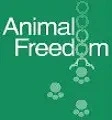Factory farming on the present scale as we see today does not go back far.
What are the factors that have stimulated this development?
Several factors have contributed to the development of the factory farming industry.
First of all you have the cattle feed industry in whose interest it is to produce as much cattle feed as possible at the lowest cost.
With the present size of the pig and chicken fattening units the cattle feed trucks can drive relatively efficient.
The cattle feed industry made it easy for the farmer to start an intensive livestock farm (financing the factory unit often organizing the building and the necessary licenses etc.).
The only thing the farmer needed to do was to sign on the dotted line.
The banks are always more than willing to lend money for the farmers business.
It concerns very large amounts of money, very often up to 750,000 dollars.
The banks get fat on the interest.
For a farmer it's further important to raise as many animals as possible in a short period of time.The higher his profit the sooner he can pay off his loan. It seems that all parties involved have the same target, "big" business, low profile and clean and efficient production.
Only the animals, who are being "produced" in large quantities suffer and also the environment, if the farmer dumps as much manure on his land as it can handle and often even more. |

